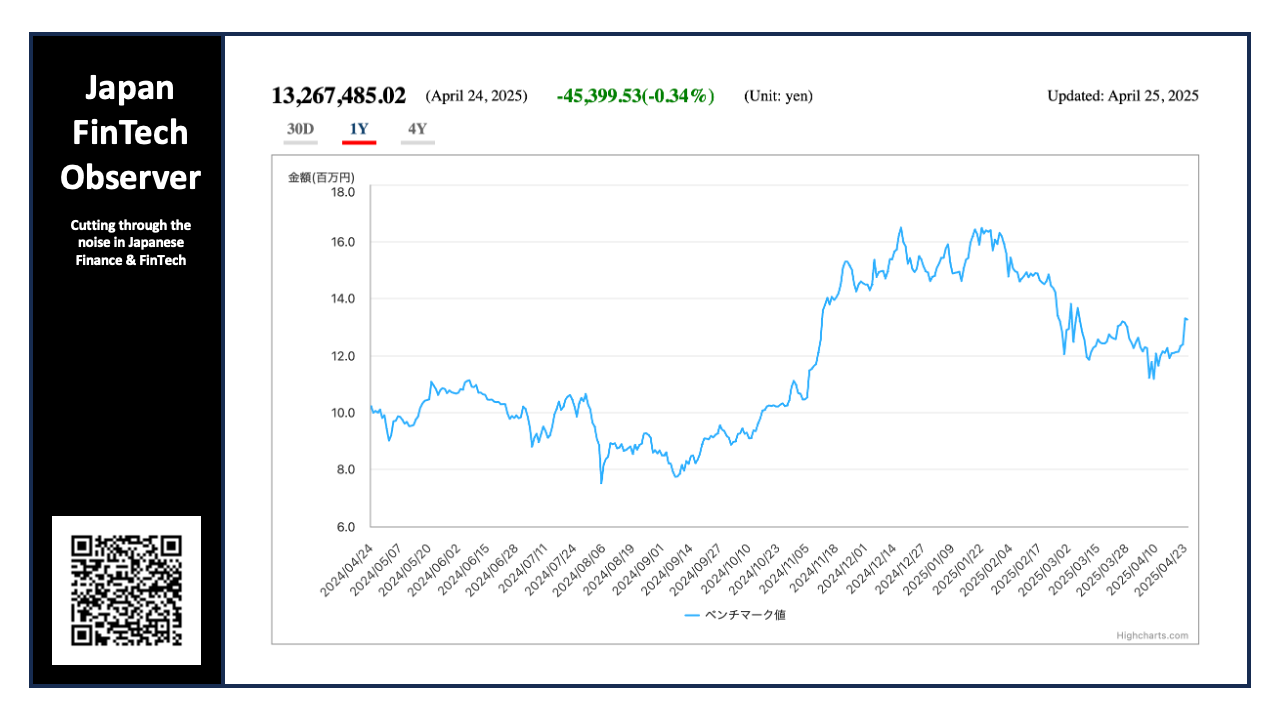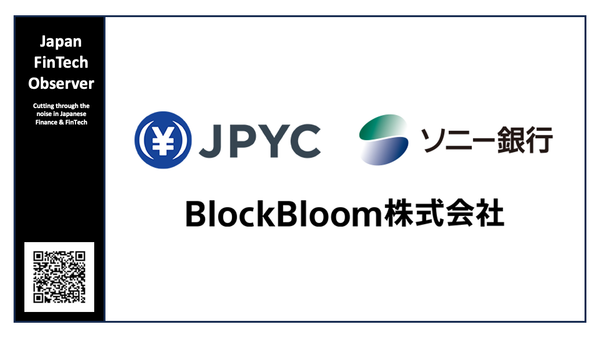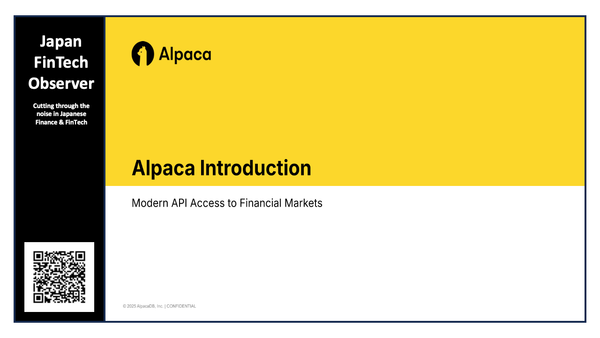Quick launches JPY-denominated Bitcoin Index

The "Crypto Asset Benchmark Study Group" organized by QUICK Corporation published a report entitled "Ecosystem Construction and Ripple Effects Brought About by a Domestic Crypto Asset Benchmark," which summarizes the discussions on the development of a domestic yen-denominated crypto asset benchmark (index).
Discussions are accelerating in Japan regarding the creation and sale of cryptocurrency exchange-traded funds (ETFs), and strong demand is expected for yen-denominated cryptocurrency benchmarks. The study group, which includes cryptocurrency exchanges, asset management companies, trust banks, securities companies, and legal experts, has been conducting research, studies, and discussions with the aim of developing benchmarks that can be used for cryptocurrency ETFs/funds and derivatives such as futures, based on yen-denominated trading prices of cryptocurrency spot transactions in Japan.
Based on the discussions at the study group, QUICK has begun experimentally calculating and publishing a benchmark based on domestic yen-denominated Bitcoin trading prices from April 25, 2025, onwards.
1. Executive Summary
1.1 Background and Objectives
The primary driver is the growing interest in cryptocurrency ETFs (Exchange Traded Funds), both domestically and internationally (especially in the U.S.). This fuels the demand for robust, manipulation-resistant cryptocurrency benchmarks in Japan. Creating a yen-denominated benchmark based on domestic crypto exchange data is seen as crucial for investor protection. It will reduce the gap between the theoretical price derived from the benchmark and the market price of domestic crypto ETFs, promoting stability and investor confidence. This, in turn, is expected to attract arbitrage trading, boosting liquidity within the domestic cryptocurrency market. The use case of such benchmarks goes beyond just financial instruments and can be used for various valuation purposes. QUICK aims to develop benchmarks that can be used for ETFs/funds and derivatives, aiming for resilience against price manipulation.
1.2 Market and Regulatory Trends
The cryptocurrency market is substantial, with a market capitalization of approximately 359 trillion yen (as of March 31, 2025), with Bitcoin comprising roughly 244 trillion yen. Currently, Japanese regulations do not allow for the creation and sale of cryptocurrency ETFs. There is growing momentum from both the private sector and within the Liberal Democratic Party (LDP) to enable the formation and sales of crypto ETFs in Japan. In the United States, Bitcoin spot ETFs launched in January 2024, have rapidly grown, reaching almost $100 billion USD in Assets Under Management (AUM). Domestically, the number of cryptocurrency trading accounts is approaching one-third of the number of individual securities accounts. The legal treatment of cryptocurrencies as financial products is being actively discussed as a potential path forward.
1.3 Future Development Plans
The research group will use the opinions of its members and the IOSCO Principles for Financial Benchmarks as a foundation. They will also examine overseas cryptocurrency benchmarks. QUICK will define the methods of benchmark calculation and establish standards for selecting reference exchanges (price data providers) and implement a code of conduct. QUICK plans to calculate and publish test cryptocurrency benchmarks and recruit/select exchanges for price data in 2025. The goal is to begin the actual calculation of the benchmark by the second half of 2025.
2. Cryptocurrency Benchmark Research Group
2.1 Background
Emphasizes the need for yen-denominated cryptocurrency benchmarks resilient to manipulation due to the growth of crypto ETFs globally. Without such a benchmark, arbitrage opportunities and investor protection in the domestic market are hampered.
2.2 Objective
QUICK formed the research group to solve problems related to developing cryptocurrency benchmarks, by involving cryptocurrency exchanges, asset managers, trust banks, securities companies, and legal experts. The ultimate aim is to develop a market standard. This report outlines the discussions in the group.
3. Market and Regulatory Trends Regarding Cryptocurrency
3.1 Market Trends
The cryptocurrency market has grown rapidly. Market capitalization has reached roughly 39.4% of the Tokyo Stock Exchange (TSE) Prime market. Bitcoin has 244 trillion yen market cap and dwarfs the 41 trillion yen valuation of Toyota, the leading listed company in Japan.
3.2 Cryptocurrency ETFs and Benchmarks in Japan and the US
Japan prohibits cryptocurrency ETF due to the definition of specified assets. On the other hand, Bitcoin ETF in the US saw emergence, thus creating a need for similar ETFs in Japan.
- The US launched Bitcoin spot ETFs in January 2024, and their AUM is approximately $100B.
- The ETFs typically reference a benchmark from CME CF Bitcoin Reference Rate.
- These ETFs usually utilize multiple reference exchanges.
3.3 Trends in Spot Cryptocurrency Trading in Japan
According to the Japan Virtual and Crypto Assets Exchange Association (JVCEA), the number of cryptocurrency trading accounts is approximately 12.31 million in February 2025. That represents approximately one-third of the securities trading accounts in Japan. 70% of crypto assets held are Bitcoin.
3.4 Regulatory Trends in Japan
Cryptocurrency trading is regulated by the Payment Services Act, requiring registration as a cryptocurrency exchange. As of January 31, 2025, 29 registered cryptocurrency exchanges existed. Manipulative trading is prohibited by the Financial Instruments and Exchange Act (FIEA) and the Payment Services Act. The Japan Institute of Certified Public Accountants (JICPA) has issued guidance on accounting treatment for crypto assets. For end-of-period valuation, it is determined if an active market exists. If so, the market price is used. In practice, "market price" is the price where most trading is conducted.
4. Considerations for the Development of a Cryptocurrency Benchmark
4.1 IOSCO Financial Benchmark Principles
The report emphasizes the need to comply with IOSCO principles to increase fairness and resilience against manipulation. TIBOR and TORF have been designated as specified financial indicators under the FIEA. QUICK, in its work, aims to comply with IOSCO's principles for all its crypto benchmark designs.
- Governance: Establishes the responsibilities of the benchmark administrator.
- Quality: Stresses the reliability and accuracy of benchmark data.
- Methodology: Stipulates transparent and rigorous calculation methods.
- Accountability: Requires responsiveness to complaints and transparency.
4.2 Outline of Cryptocurrency Benchmarks to be Calculated
The report prioritizes the development of Bitcoin benchmarks, both daily and real-time.
- The observation period for price data is from 14:30 to 15:30 (Japan time) on business days.
- The calculation formula uses VWAP (Volume Weighted Average Price) data at 5 minute intervals, with enhanced robustness calculations.
4.3 Cryptocurrency Benchmark Calculation Method
- The calculation relies on price data from multiple exchanges and from the trading floors (versus the sales floors). These are the most important considerations to develop manipulation resistance in the benchmark.
- The prices are converted to JPY.
- In regard to the data observation period, there was opinion to set the trading data at a time of high liquidity, while other parties suggested keeping the observation data during the daytime.
- Several benchmark options for observation are also explored.
- CME approach: average one-hour period around the market's close
- Hong Kong Exchange Benchmark: based on 24-hour volume weighting.
- Regarding the calculation formula, abnormal prices and larger transaction volumes are excluded. In the same vein, the prices are also assessed for distorted information.
4.4 Selection Criteria for Reference Exchanges and Code of Conduct
- The report highlights the importance of having a code of conduct for data providers.
- A reference to self dealing, i.e. is the data pure pricing or are the exchanges also trading on their own platforms. Self-dealing and front-running are strongly discouraged.
- Specific Code of Conduct Measures - The draft conduct code includes, among other things:
- Providing the price information that is used to establish benchmarks.
- Establishing data security.
- Prohibiting collusion, exchange of information for price fixing purposes.
- The obligation to provide feedback.
5. Future Schedule
5.1 Calculate and Publish Test Cryptocurrency Benchmarks
QUICK will, after the publication of this report and having received feedback from the research group, create and publish test crypto benchmarks.
5.2 Recruit Reference Exchanges
QUICK will recruit reference exchanges.
5.3 Calculate and Publish Cryptocurrency Benchmarks
By the latter half of 2025, QUICK will use the price data to calculate and publish its benchmarks.
5.4 Expand Target Cryptocurrency and Benchmark Scope
The report closes by stating that they will consider additional cryptocurrencies and types of benchmarks, considering the needs of the market.
6. Key Themes and Implications
6.1 Investor Protection and Market Development
The report strongly emphasizes that a well-regulated and manipulation-resistant cryptocurrency benchmark is crucial for promoting investor confidence and fostering a healthy domestic market for crypto assets and related financial products.
6.2 Regulatory Alignment
The project aligns with the global trend towards regulating cryptocurrency markets and creating robust benchmarks. The effort to comply with IOSCO principles is a significant step.
6.3 Competition and Innovation
The emergence of domestic cryptocurrency benchmarks could stimulate competition among exchanges and encourage innovation in financial products and services based on cryptocurrency.
6.4 Challenges and Considerations
The report recognizes the technical and regulatory challenges associated with developing robust cryptocurrency benchmarks, including the need for reliable data sources, effective manipulation detection, and ongoing adaptation to the evolving market landscape.
6.5 QUICK's Role
QUICK's proactive role in leading this research and development effort positions them as a key player in shaping the future of the cryptocurrency market in Japan.




